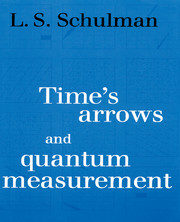Book contents
- Frontmatter
- Contents
- Preface
- 1 Introduction
- 2 Irreversibility
- 3 Arrows of time
- 4 Correlating arrows of time
- 5 Two-time boundary value problems
- 6 Quantum measurements: cats, clouds and everything else
- 7 Existence of special states
- 8 Selection of special states
- 9 Abundance of special states
- 10 Experimental tests
- 11 Conclusions and outlook
- Author index
- Index
7 - Existence of special states
Published online by Cambridge University Press: 05 August 2012
- Frontmatter
- Contents
- Preface
- 1 Introduction
- 2 Irreversibility
- 3 Arrows of time
- 4 Correlating arrows of time
- 5 Two-time boundary value problems
- 6 Quantum measurements: cats, clouds and everything else
- 7 Existence of special states
- 8 Selection of special states
- 9 Abundance of special states
- 10 Experimental tests
- 11 Conclusions and outlook
- Author index
- Index
Summary
The existence of ‘special’ states can be established with ordinary quantum mechanics. We seek particular microscopic states of large systems that have the property that they evolve to only one or another macroscopic outcome, when other microstates of a more common sort (having the same initial macrostate) would have given grotesque states. Justifying the hypothesis that Nature chooses these special states as initial conditions is another matter. In this chapter we stick to the narrower issue of whether there exist states that can do the job, irrespective of whether they occur in practice.
In Section 7.1 we give several explicit examples. In Section 6.2 we exhibited an apparatus model and its special states. Here we look at the decay of an unstable quantum state, not as a single degree of freedom in a potential, but with elements of the environment taken into account as well. We also study another popular many-body system, the spin boson model. This has extensive physical applications and especially with respect to Josephson junctions has been used to address quantum measurement questions. A single degree of freedom in a potential, by the way, does not generally lend itself to ‘specializing,’ and an example is shown below.
In recent years, exotic non-local effects of quantum mechanics have been exhibited experimentally. Behind many of these lies entanglement, the property of a wave function of several variables that it does not factor into a product of functions of these variables separately.
- Type
- Chapter
- Information
- Time's Arrows and Quantum Measurement , pp. 225 - 251Publisher: Cambridge University PressPrint publication year: 1997



